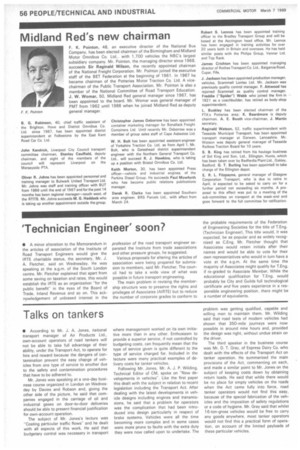Talks on tankers
Page 58

If you've noticed an error in this article please click here to report it so we can fix it.
• According to Mr. J. A. Jones, national transport manager of Air Products Ltd., own-account operators of road tankers will not be able to take full advantage of their ability, under the Transport Act, to operate for hire and reward because the dangers of 'contamination prevent the easy change of vehicles from one type of service to another due to the safety and contamination procedures that have to be adhered to.
Mr. Jones was speaking at a one-day business course organized in London on Wednesday by Davies and Robson and, giving the other side of the picture, he said that com panies engaged in the carriage of oil and industrial gases on door-to-door deliveries should be able to present financial justification for own-account operation.
The subject of Mr. Jones's lecture was "Costing particular traffic flows" and he dealt with all aspects of this work. He said that budgetary control was necessary in transport where management worked on its own initiative more than in any other. Enthusiasm to provide a superior service, if not controlled by budgeting costs, can frequently mean that the type of service given is quite different to the type of service charged for. Included in the lecture were many practical examples of delivery costs for tanker vehicles.
Following Mr. Jones, Mr. A. J. P. Wilding, Technical Editor of CM, spoke on "New developments in vehicles". Like the first paper this dealt with the subject in relation to recent legislation including the Transport Act. After dealing with the latest developments in vehicle designs including engines and transmissions, he said that a problem for operators was the complication that had been introduced into design particularly in respect of brake systems. Vehicles were all the time becoming more complex and in some cases were more prone to faults with the extra duty they were now called upon to undertake. The problem was getting qualified, capable and willing men to maintain them. Mr. Wilding said that road tests of modern vehicles had shown that 350-mile journeys were now possible in around nine hours and, provided the design was right, without undue strain on the driver.
The third speaker in the business course was Mr. D. T. Gray, of Express Dairy Co. who dealt with the effects of the Transport Act on tanker operation. He summarized the main provisions of the Act, commenting on each, and made a similar point to Mr. Jones on the subject of keeping costs down by obtaining return loads. He said that while there would be no place for empty vehicles on the roads when the Act came fully into force, road tanker operators would not find this easy, because of the special fabrication of the vehicles and the imposition of safety regulations or a code of hygiene. Mr. Gray said that whilst 16-ton-gross vehicles would be free to carry any goods anywhere, most tanker operators would not find this a practical form of operation, on account of the limited payloads of these particular vehicles.












































































































































































